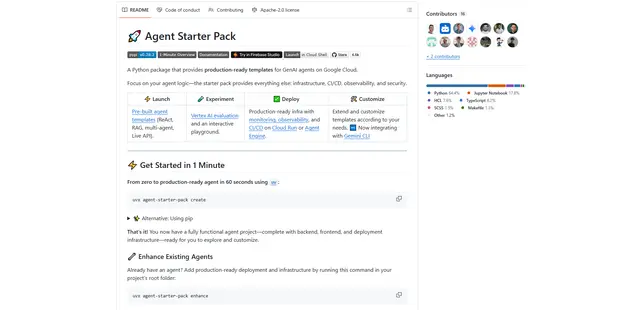
Fern
Fern is a toolkit that transforms API definitions into production-ready SDKs and beautiful documentation in minutes, supporting multiple languages and API specifications while offering enterprise-level features.
https://buildwithfern.com/?ref=producthunt

Product Information
Updated:Oct 9, 2025
What is Fern
Fern is a Y Combinator-backed (W23) developer tools company founded in 2022 that helps companies deliver high-quality SDKs and API documentation. It acts as a comprehensive platform for API-first development, allowing teams to generate and maintain client libraries, API documentation, and server boilerplate from a single source of truth. The platform is fully compatible with leading API specifications including OpenAPI, AsyncAPI, Protobuf (gRPC), and OpenRPC, while also offering its own simpler Fern Definition format.
Key Features of Fern
Fern is a comprehensive API development platform that transforms API definitions into production-ready SDKs and interactive documentation. It supports multiple API specification formats (OpenAPI, AsyncAPI, gRPC, etc.), generates type-safe SDKs in various programming languages (TypeScript, Python, Java, Go, Ruby, PHP, C#), and creates beautiful, interactive API documentation. The platform includes features like automatic SDK updates, OAuth 2.0 support, server-sent events, and enterprise-level migration support.
Multi-language SDK Generation: Automatically generates and publishes idiomatic SDKs in multiple programming languages with built-in features like OAuth 2.0, pagination, and type safety
Interactive Documentation: Creates beautiful, interactive API documentation with features like AI-powered search, content migration tools, and API key injection
CI/CD Integration: Seamlessly integrates with CI/CD pipelines to automatically generate and publish updated SDKs when API changes occur
Enterprise Support: Offers dedicated migration support, custom theming, and security compliance features for enterprise clients
Use Cases of Fern
API-First Development: Teams can maintain a single source of truth for their API specification and automatically generate consistent SDKs and documentation
Legacy API Migration: Companies can modernize their existing APIs with professional migration support and improved developer experience
Multi-Protocol API Support: Organizations can handle complex APIs that use multiple protocols (REST, gRPC, WebSocket) with unified SDK generation
Pros
Generates high-quality, language-idiomatic SDKs that developers prefer over alternatives
Provides comprehensive enterprise support and migration assistance
Offers seamless integration with existing development workflows and CI/CD pipelines
Cons
May require subscription to Pro or Enterprise plans for advanced features
Dependency on external service for SDK generation and documentation hosting
How to Use Fern
Install Fern CLI: Install the Fern CLI tool using npm. Requires Node 18+. Run: npm install -g fern-api
Import API Specification: Start with your existing API specification - can be OpenAPI, AsyncAPI, OpenRPC, gRPC, or create a new one using Fern Definition format
Initialize Fern Project: Create a new Fern project which will generate a fern/ folder containing: fern.config.json (root configuration), generators.yml (generator settings), and definition/ folder for API specs
Configure Documentation Settings: Update the docs.yml file in the fern folder with your documentation settings and organization details
Select SDK Languages: Choose which programming languages you want to generate SDKs for. Fern supports TypeScript, Python, Go, Java, Ruby, C# & PHP
Generate SDKs and Docs: Run 'fern generate' command to create SDKs and documentation. Use --docs flag for documentation only or --preview to preview changes
Publish Packages: Fern will automatically version and publish the generated SDK packages to appropriate registries (npm, PyPI, Maven etc.)
Integrate with CI/CD: Add Fern generation commands to your CI/CD pipeline to automatically update SDKs and docs when your API changes
Preview and Deploy: Use 'fern docs dev' to preview documentation locally on port 3000. Deploy changes to production when ready
Fern FAQs
Fern supports OpenAPI, AsyncAPI, OpenRPC, gRPC, and their own simpler Fern Definition format as input specifications for generating SDKs.











